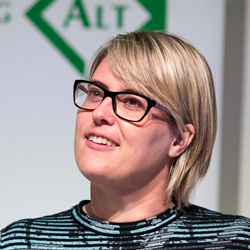
Dr Maren Deepwell
Chief Executive, Association for Learning Technology (ALT)
The past year has seen use of learning technology on an unprecedented scale across all sectors. Now we must address the challenges that have arisen from it.
Technology has been a hugely positive tool for us in these difficult times. Learners of all ages have been making use of technology to continue to be able to access education.
That said, it’s certainly not without its difficulties. It’s important for us to consider and deal with the unforeseen consequences of education technology: cyber security and privacy concerns, particularly for younger learners, are a big issue.
Students all over the world have been expressing concerns regarding tools like proctoring software and surveillance, like techniques used to track learning and engagement.
Edtech ethics are growing in importance
Our members have identified a gap between institutional ethical policies and efforts developers and providers are making – calling for an overarching ethical framework that can be used by individuals, institutions and providers.
Ethical codes for the use of learning analytics were established years ago, however, ALT’s professional accreditation framework was expanded to include ethical considerations for professional practice and research last year. There is, as yet, no solution for practitioners and professionals for scaling up the use of learning technology.
Developing a new ethical framework
ALT has established a working group including student and industry voices, with the aim to develop a new framework that’s fit for purpose and will support the ethical deployment and use of technology in education and training. The framework will include practical tools including a checklist, case studies and reflective questionnaires for individuals, institutions and providers.
Key to the new framework is to evaluate not only the impact on learning outcomes, but also the governance and implementation of technology used in education. We recognise the wider context of learning technology policy, theory and history as fundamental to its ethical, equitable and fair use and this will be reflected in the framework.
ALT offers free, fortnightly CPD webinars and resources to all practitioners, see www.alt.ac.uk , and provides accreditation via its professional framework, CMALT for more info please visit www.alt.ac.uk/certified-membership

